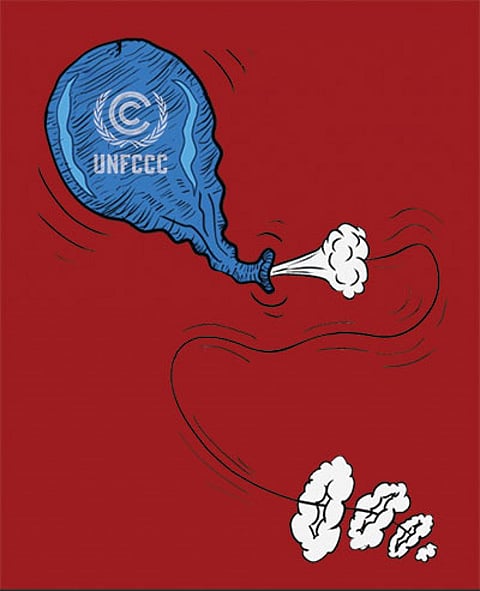Time to abandon UNFCCC to address climate change
While we've made enormous progress in 25 years, the world is still running behind climate change... Today, the urgency to address climate change has never been greater. But because of the work begun 25 years ago, we are also better coordinated to take it on. We have the Paris Agreement, and we have the guidelines strengthening that agreement.”
This is a summary of the statement that Patricia Espinosa, executive secretary of the United Nations Framework Convention on Climate Change (UNFCCC), put out on the 25th anniversary of the entry into force of the Convention. While I agree with her sentiments to address climate change urgently, I disagree on two points: the progress made by UNFCCC so far and its potential to deliver results in the future.
UNFCCC was adopted with an objective to “stabilise greenhouse gas (GHG) concentrations in the atmosphere…”. Over the past 25 years, GHG concentrations, far from stabilising, have reached record levels. The concentration of carbon dioxide (CO2) has increased from 358 parts per million (ppm) in 1994 to 412 ppm in 2018; 400 ppm was last witnessed on Earth about 3 million years ago.
Global temperature too has increased from 0.250 C above the pre-industrial era in the early 1990s to 1.10 C in 2018. All this while the intensity and frequency of extreme weather events have significantly increased. Between 1997 and 2016, extreme weather events claimed more than 0.5 million lives and resulted in economic losses worth US $3.16 trillion worldwide. And, if we take note of the Intergovernmental Panel on Climate Change’s (IPCC) “Special Report on 1.50C”, these numbers would seem minuscule 10 years from now.
Despite brokering a protocol (Kyoto), two agreements (Cancun and Paris) and hundreds of decisions on myriad climate change issues, UNFCCC has little to show as results. GHGs are today 60 per cent above 1994 levels. Emissions are increasing even in developed countries that had pledged to reduce emissions. The fact is that UNFCCC has failed to catalyse change in global energy system over the last 25 years. In 1994, about 80 per cent of the global primary energy supply came from fossil fuels. This figure has remained unchanged even in 2018. The number of energy poor people too has remained the same in 1994 and 2018—2.8 billion people continue to use polluting solid fuels to cook food.
IPCC’s special report makes it clear that to limit warming at 1.50 C, CO2 emissions will have to be reduced by 45 per cent by 2030 from 2010 levels. This means that we have 12 years to turn around the energy system. Can UNFCCC deliver on this?
It’s very unlikely because the Paris Agreement doesn’t have the tools to drive global collective action to combat climate change. UNFCCC is now a platform to collect, synthesise and disseminate information. In such a situation, the continuation of international efforts at UNFCCC should be curtailed and energy directed elsewhere.
The fact is that combating climate change now requires hard targets and rapid transition in all sectors. This can only happen if we adopt some radically different strategies. Let me propose two: first, let’s create multiple sectoral and regional platforms to push for international “sectoral” treaties to achieve real transition in energy, transport, agriculture and industrial sectors. Second, climate change is too important an issue to be left to governments alone. We need government-plus strategy, especially concrete actions from the private sector. To push private sector, we will have to make climate change their fiduciary duty and hold them accountable for polluting the climate. I know that all these ideas would be considered a non-starter. But it is better we try something different now than regret later.
(This article was first published in Down To Earth's print edition dated April 16-30, 2019.)


